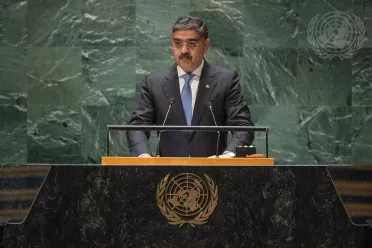Statement
Statement summary
ANWAAR-UL-HAQ KAKAR, Prime Minister of Pakistan, said conflicts rage in Ukraine and in 50 other places around the world. Tensions between the global powers have continued to escalate, with the rise of new and old military and political blocs. “The world cannot afford Cold War 2.0.,” he asserted, noting that challenges confronting humankind demand global cooperation and collective action. A succession of exogenous “shocks” — COVID-19, conflict and climate change — have devastated the economies of many developing countries. Poverty and hunger have grown, reversing development gains of three decades, he observed, calling for the implementation of the Sustainable Development Goals Stimulus, the expansion of concessional lending by multilateral development banks, and the resolution of the debt problems of the 59 countries in debt distress. Also crucial is the fulfilment of the climate change commitments made at the twenty-eighth UN Climate Change Conference by the developed world: to provide over $100 billion in annual climate finance; allocate at least half of such finance for adaptation in developing countries; operationalize the fund and funding arrangements for loss and damage; and accelerate their carbon emission mitigation targets.
Pakistan is one of the worst-affected countries from the impacts of climate change, he pointed out, drawing attention to the epic floods of last summer, which submerged a third of the country, killed 1,700 and displaced over 8 million people, destroyed vital infrastructure and caused over $30 billion in damage to the country’s economy. Commending the commitment of over $10.5 billion for Pakistan’s comprehensive recovery plan — “the 4RF Plan” — he expressed hope that his Government’s development partners will accord priority to allocation of funds for the plan. Reiterating his Government’s commitment to rapid economic recovery, he outlined plans to stabilize the country’s foreign exchange reserves and currency, expand domestic revenues and mobilize significant domestic and external investment. “Pakistan’s long-term shift to geoeconomics is well underway,” he said, noting that the second phase of the China-Pakistan Economic Corridor has been initiated.
Underscoring that Kashmir is the key to peace between Pakistan and India, he said that, since 5 August 2019, India has deployed 900,000 troops in illegally occupied Jammu and Kashmir to impose the “final solution” for Kashmir. To this end, India has imposed extended lockdowns and curfews; jailed all the genuine Kashmir leaders; violently suppressed peaceful protests; resorted to extrajudicial killings of innocent Kashmiris in fake “encounters” and so-called “cordon and search operations”; and imposed collective punishments, destroying entire villages. In light of this, global Powers should convince New Delhi to accept Pakistan’s offer of mutual restraint on strategic and conventional weapons, he asserted. Turning to the situation in Afghanistan, he said peace there is “a strategic imperative for Pakistan” and advocated for continued humanitarian assistance to its population, in which Afghan girls and women are the most vulnerable, as well as for the revival of its economy and implementation of the connectivity projects with Central Asia. He also condemned the cross-border terrorist attacks against Pakistan by the Tehrik-e Taliban Pakistan, Da’esh and other groups operating from Afghanistan.
Further, he commended the progress made towards ending the conflicts in Syria and Yemen, as well as the normalization of relations between Saudi Arabia and Iran. Unfortunately, he continued, the tragedy of Palestine continues, with Israeli military raids, air strikes, expansion of settlements and evictions of Palestinians. Turning to terrorism, he opposed “State terrorism” and underlined the need to address its root causes, such as poverty, injustice and foreign occupation. He also voiced concern over the proliferation of Islamophobia: while it is an age-old phenomenon, after the 9/11 terrorist attacks, it has assumed epidemic proportions, as manifested in the negative profiling of Muslims and attacks on Islamic sites and symbols, such as the recent public burnings of the Holy Quran.
As tensions between global powers continue to escalate with the rise of new and old military and political blocs, “geo-politics is resurging when geo-economics should be at the top of the international agenda, the Prime Minister of Pakistan told the UN General Assembly on Friday.
Full statement
Read the full statement, in PDF format.
Photo

Previous sessions
Access the statements from previous sessions.
